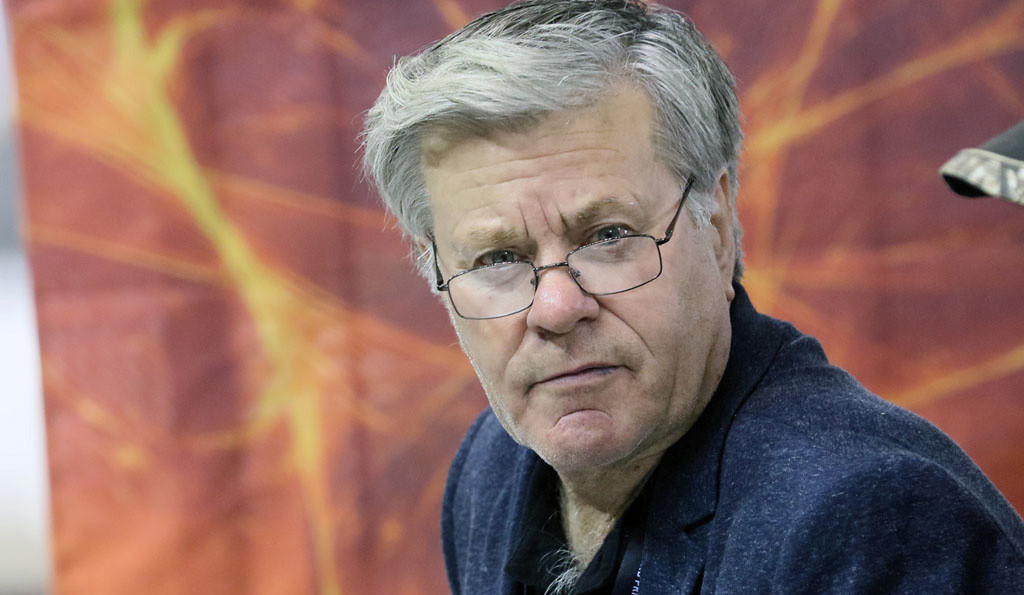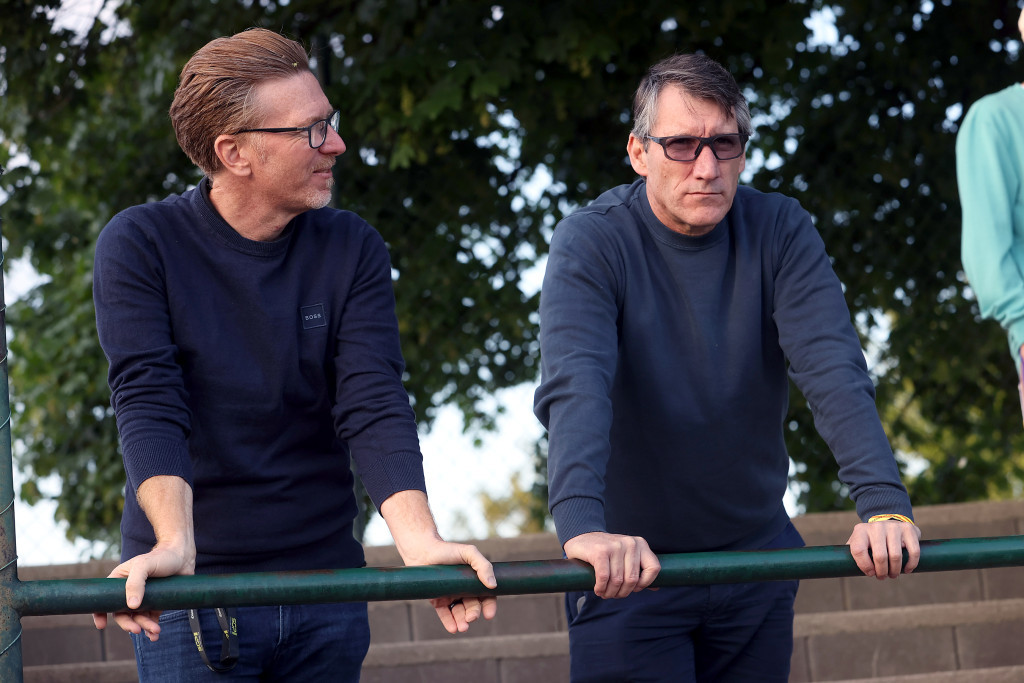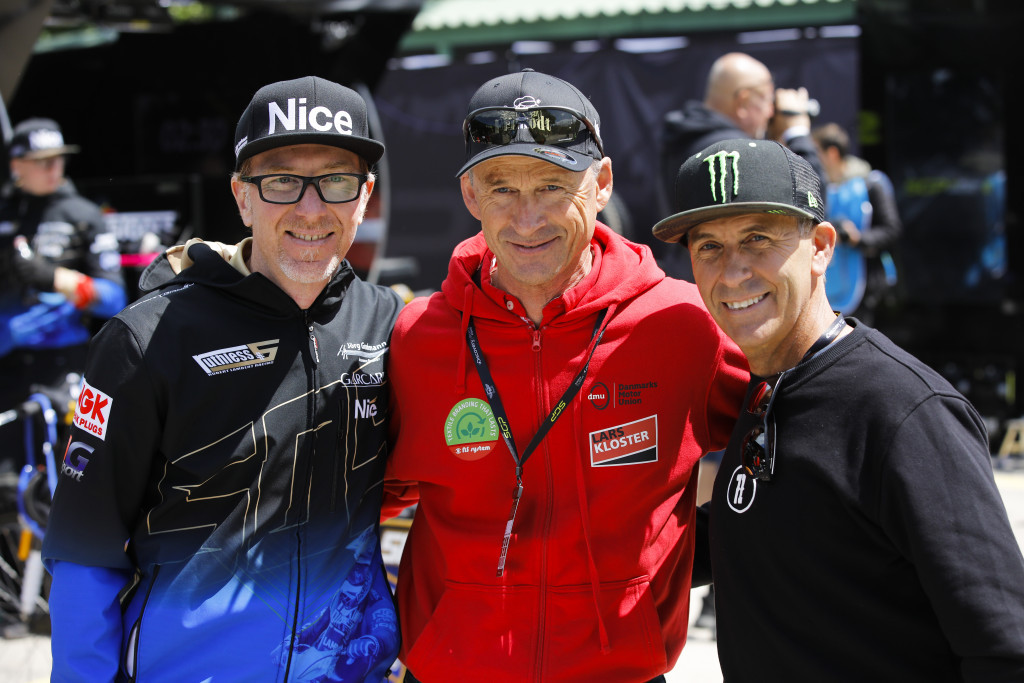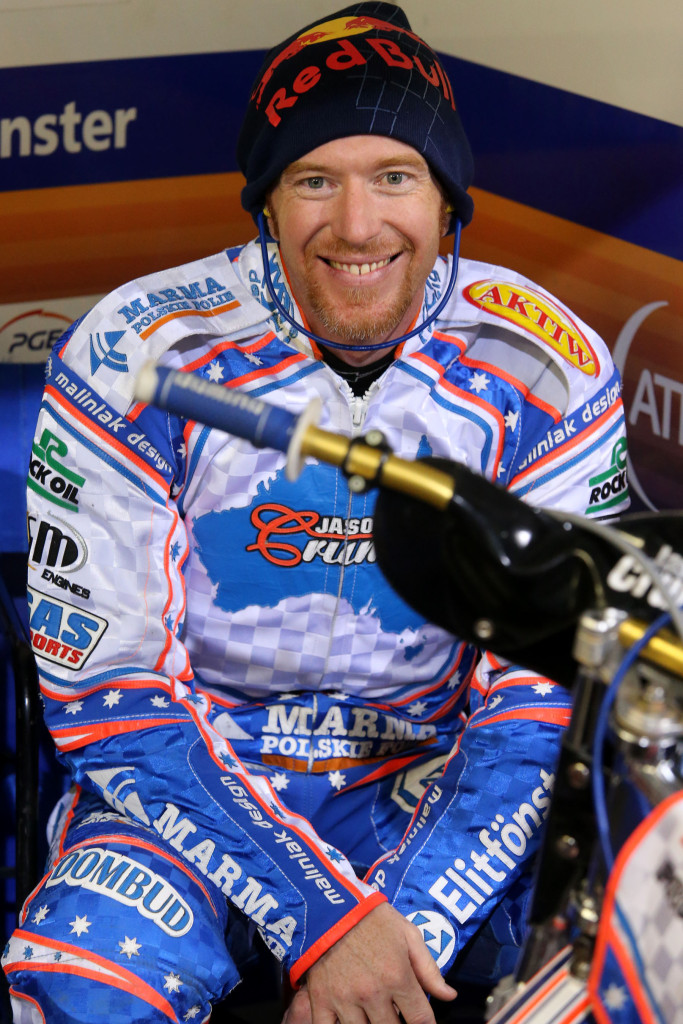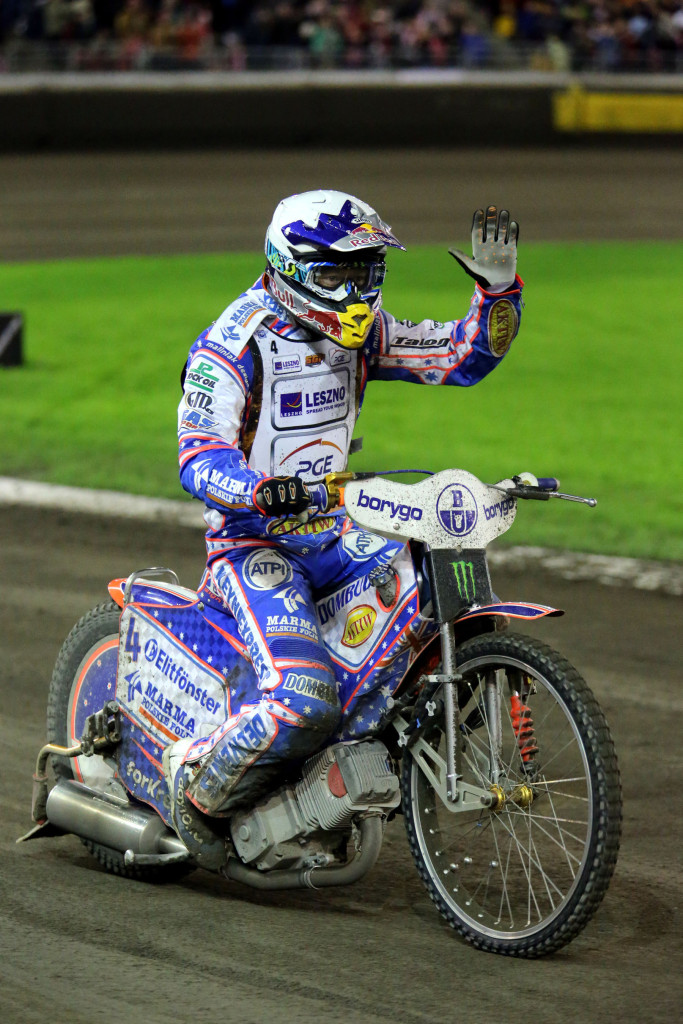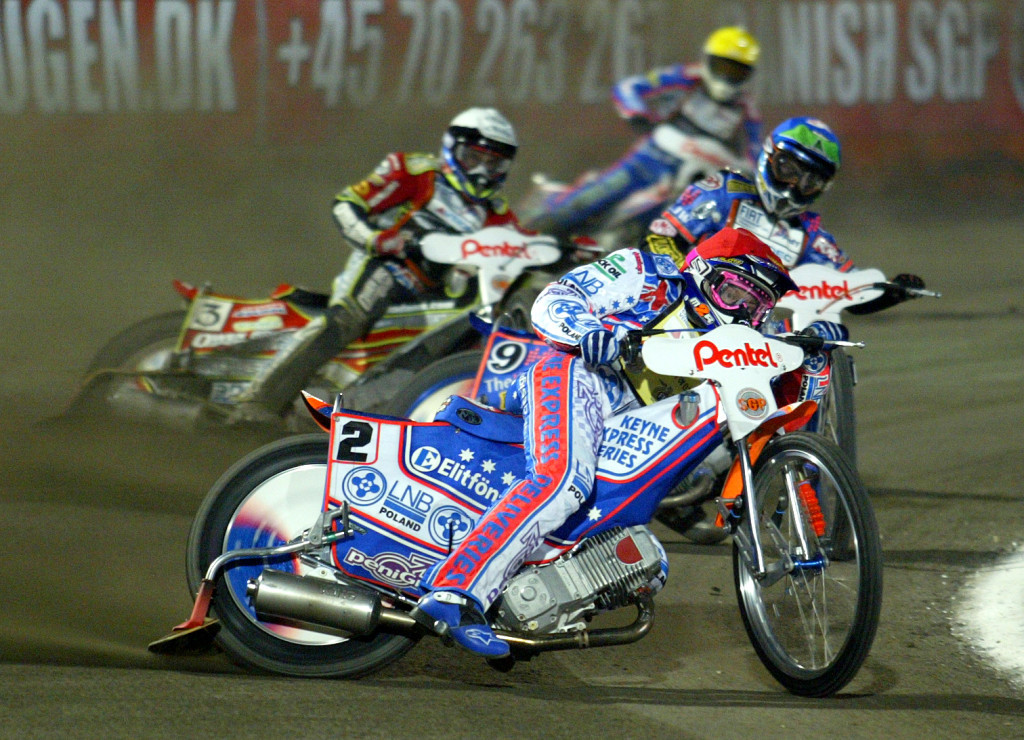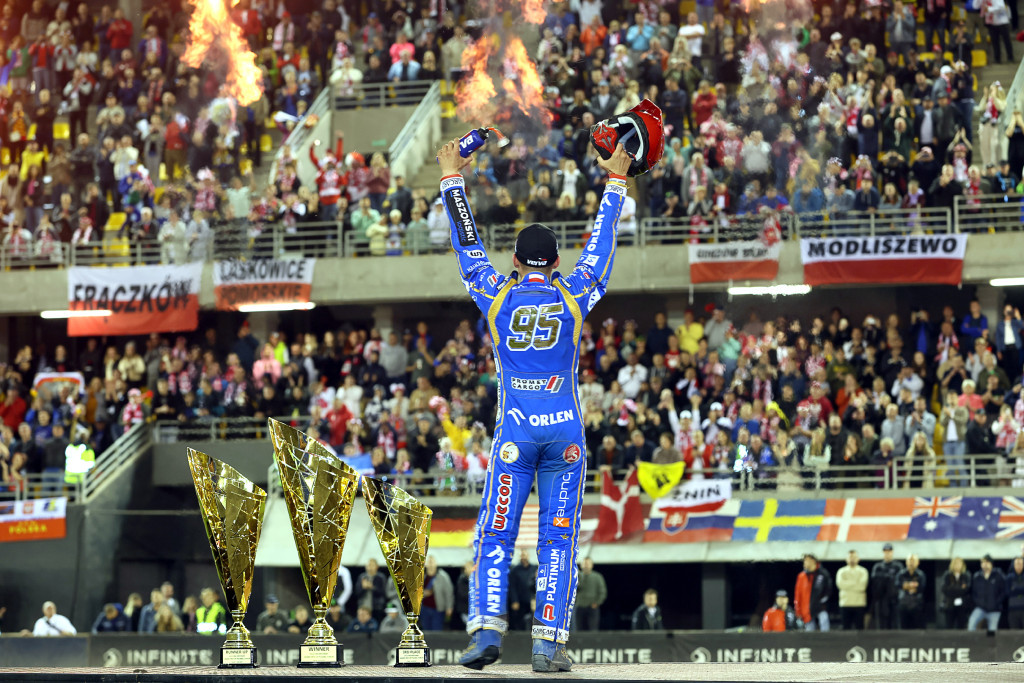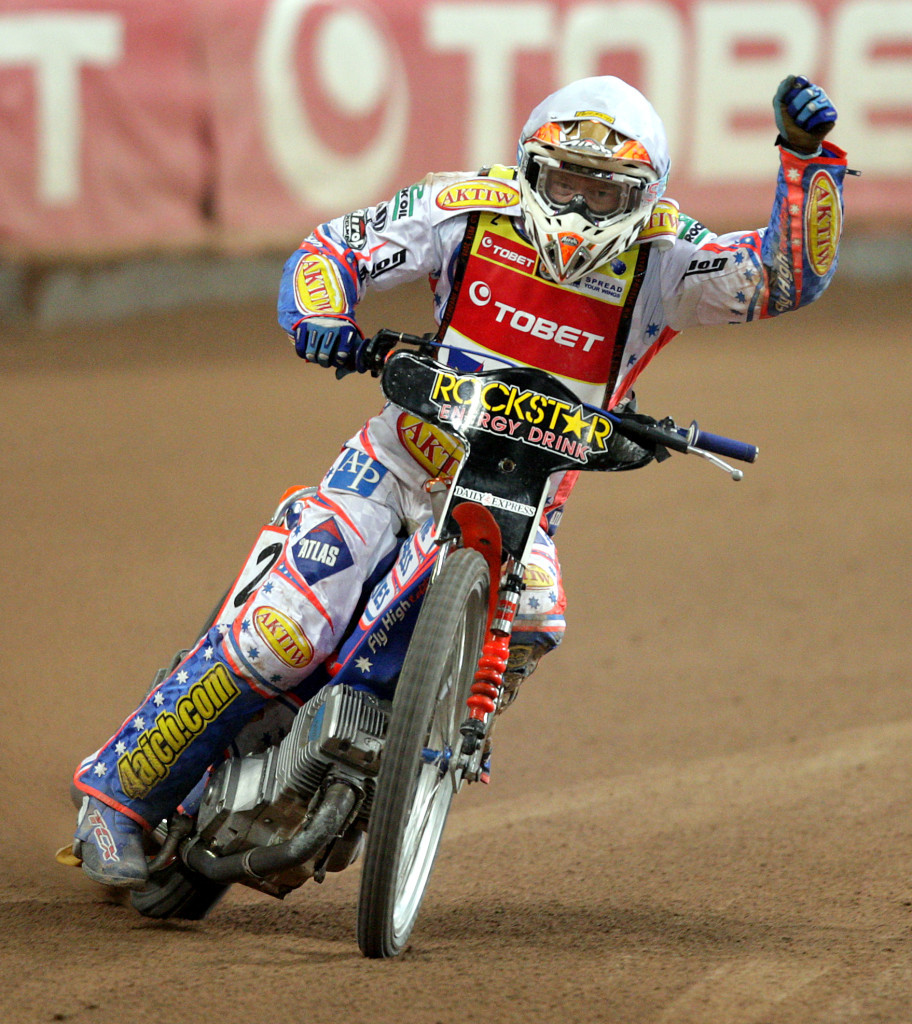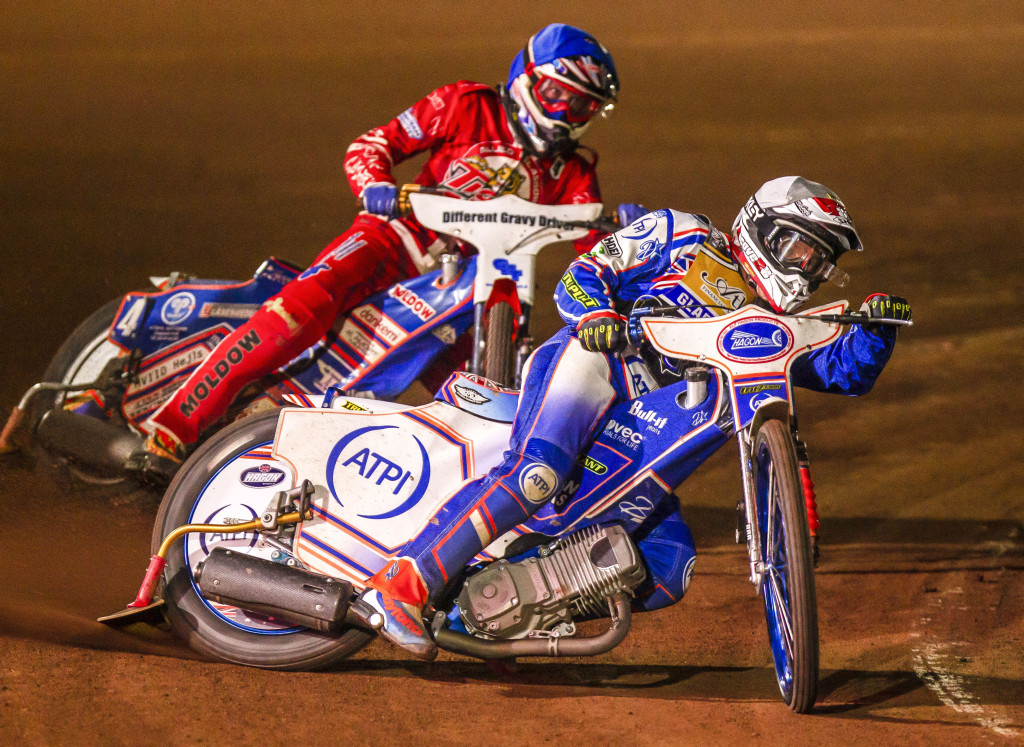FIM SPEEDWAY STARS OF THE CENTURY | JASON CRUMP
22/11/2023
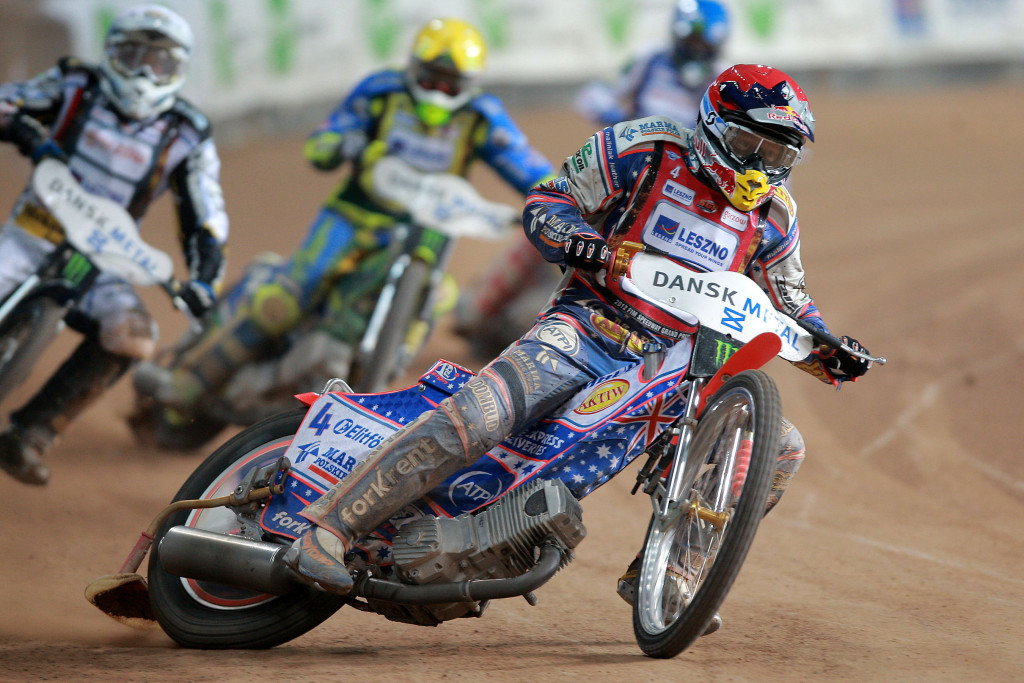

With three Speedway GP World Championships and a joint-record 23 Speedway GP victories to his name, Australia’s greatest-ever speedway rider Jason Crump is one of the most decorated stars of the SGP era.
His 10 straight seasons in the world’s top three from 2001 to 2010 is only equalled by five-time FIM Speedway world champion Ove Fundin. As part of speedway’s 100th anniversary celebrations in 2023, FIMSpeedway.com’s PAUL BURBIDGE caught up with Crump for the latest instalment of our Stars of the Century series …
As the son of former world No.3 Phil Crump, it’s not hard to figure out how you were introduced to the sport. But what were your first memories of speedway as a child?
“The first memories I have of speedway are probably from Swindon (UK), where my dad raced. As a kid, I started going to speedway pretty much from when I was born. I guess the noise wasn’t something that was different for me. I remember a bit about the racing at Swindon. Then the memories started to get much clearer as I got older.
“There was a huge number of American riders in the UK at that time and they were all pretty cool guys. For me, that meant I got stickers and caps and things like that from all those guys. Those are my earliest memories of speedway.”
While most people first encounter their speedway heroes as fans, is it fair to say meeting riders alongside your dad allowed you to get to know them in a different way or on a different level?
“They were all good riders and people that were fortunately more than just riders for me. I would be able to meet them and get to talk to them because my dad was a rider.
“It’s the weirdest thing, isn’t it? You look at world champions like Bruce Penhall, Ivan Mauger, Peter Collins, Erik Gundersen, Hans Nielsen and Barry Briggs and they were people I had known for a long, long time. I can always remember saying hello to Ivan or Briggo from when I could talk.
“For me, growing up with those guys around me as people I knew meant I had a different introduction to speedway compared to most riders I suppose.”
Being the son of a top rider is one thing, but at what point did you decide you wanted to race yourself? Would you say it was your destiny?
“I started riding motorbikes, and it was fun. To say it was destiny or fate or anything like that … I don’t think that really comes into it because I could have got on a motorbike and said, ‘I’m not interested in doing this.’
“As a family, we grew up in two parts of the world. We spent two thirds of the year in the UK and a third of the year in Australia up until I was 12 years old.
"As I got a bit older, all the kids in Australia had motorbikes and there was a strong junior motorcycle club in Mildura – Mildura Junior Motorcycle Club.
“I enjoyed it from the first opportunities I had. It was social and I had riders around me like (now Australian team manager) Mark Lemon, (former world No.2) Leigh Adams and Jason Lyons. We all grew up together in Mildura. Although they were a few years older than me, we were all in the same junior motorcycle club and we were all within a few years of each other.
“We grew up riding together for a start and then we started racing against each other. You are talking about kids growing up in a country town with a population of 25,000 people competing for World Championships and racing for their country in World Cups. It’s pretty cool when you look back on it and think that we all came from such a small place.”
You came over to Europe in 1991 and it wasn’t long before you were crowned FIM Speedway Under-21 World Championship winner in Tampere, Finland in 1995. How much of a boost did this give you as you made your full-time Speedway GP debut in 1996?
“Before I had won that World Under-21 Championship, I had been in the 1994 FIM Speedway World Final in Vojens (finishing 11th) and also the FIM Long Track World Finals. I was kind of doing okay by that stage anyway.
“The World Under-21 Final took a bit of winning. I qualified in 1993, but I was sick, and I wasn’t able to ride. I messed up 1994 and won in 1995.
“At that time, winning the World Under-21 Championship was a big deal given that you qualified for Speedway GP on the back of that. I would like to point out that I was still in the SGP qualifying rounds at that stage. I think it was just the GP Challenge to go and I was in that, but I withdrew after I won the World Under-21 Championship.
“It’s really weird. The World Under-21 Championship was not the thing I went there to win. It sounds stupid, but I actually went there to qualify for the Grand Prix. Nobody wanted to go to the GP Challenge at that time. Without wanting to be disrespectful to anybody, the World Under-21 Final was a bit of an easier way to get into the GP.”
You picked up your first-ever Speedway GP win at the 1996 FIM British Speedway GP in Hackney. What are your memories of that night?
“It was not a very good year for me, as far as the GPs went. It was a learning year, a difficult year, and I hadn’t done very well.
“I was in the bottom two from the first GP – I got excluded in the D Final at the first one in Wroclaw, so I missed the second one because the bottom two riders dropped out.
“Then I had a bit of a dodgy run. I just couldn’t get things together in the Grand Prix the way I wanted to. There’s no doubt it was hard – it was tough. Although I had been riding a bit in different leagues, I wasn’t overly familiar with the tracks. Even if I had been to any of them, it was only once.
“I was looking forward to Hackney. I had been there as a wild card the year before and I did halfway okay (scoring 12 points). I had had a few good league meetings there. It was a local one for me – living just up the road in Northampton. I was quite happy going to Hackney and felt good about it.
“I remember at the time that my dad and one of my mates had flown over to watch that Grand Prix and it was good to have them there with me – to see them and spend time with them. The racing was not fantastic for me through the heats, but I managed to pull it together in the last race and get into the final.
“I think I was probably the only rider in the final who had nothing to lose. I know Billy Hamill and Hans Nielsen were racing for the World Championship and Greg Hancock was racing for a podium place. Maybe they forgot I was in there? I made a really good start, and they couldn’t catch me, so I was pretty happy about that. It didn’t keep me in the Grand Prix series, though. I went out at the end of that year after finishing 10th overall.”
Having just picked up that victory, did losing out on a Speedway GP spot inspire you to prove you belonged on that stage?
“That was the plan, obviously. At that time in my career, I had a decent average in Britain and Poland, but internationally, I wasn’t quite at the level where I wanted to be.
"Missing out on a spot in the Grand Prix was a big kick in the nuts and it was very disappointing. It takes a bit of time to get over that.
“I went through all the qualifying rounds in 1997 to get back into the series for 1998. From then on, I stayed in the series and never went out of it.
“I retired properly in 2012 and I think I was still No.6 in the world that year. I held my spot right to end.
“I can still remember (Swedish star) Andreas Jonsson finished ninth in the World Championship that year. There had been talk that I was going to stop riding and he came to me at the end of the meeting in Torun in 2012 and said, ‘Are you definitely done? I’m ninth. Am I going to be in or not?’
“I said, ‘Mate, you’re absolutely in. We’re flying home tomorrow, and I am not coming back to be a rider next year.’”
What helped you establish yourself as a full-time Speedway GP rider after getting back into the series in 1998?
“It took me a few years, but you look at the top riders and you learn. The top riders at the beginning of my career were Hans Nielsen, Sam Ermolenko, Tommy Knudsen, Tony Rickardsson and Simon Wigg, and they were riders that had been exceptionally consistent.
“Hans was exceptionally consistent at a high level for years and years. If you watched him racing from Monday to Friday, he wasn’t quite the same rider he was when he raced in a Grand Prix, a World Final or a qualifying round.
“Having watched all those riders, I could see you had to give 100 percent in your league racing and most riders do most of the time. But you have to hold a little bit back and that’s the fine line between league racing and the GP.
“Your standard from the league races has to go up a level or two for the Grand Prix – 100 percent. You have to remain safe and in control of raising your game for that Saturday night every fortnight.
“Looking at those guys and the way some of them did it was interesting, and it interested me how they did it. It was something I worked really hard to put into my racing – being able to stay at a very high level all the time, yet still be able to lift myself at a Grand Prix if I needed to. I was very proud of the fact that over a long period of time, I could just about do that when I needed to.”
Before you won your first Speedway GP World Championship in 2004, you had three straight silver medals, missing out to Tony Rickardsson in 2001 and 2002 and Nicki Pedersen in 2003.
Was there a lot of frustration that you had come so close to the sport’s biggest prize, falling just eight points short in 2001 and 2003, only to just miss out?
“Oh, 100 percent! I had never been on the podium until 2001. If you look at the duel that Tony and I had that year, it was six GPs in 2001 and we both won two, we both got second in two and we both reached one other final.
“But he had the pressure off going into the last GP – he didn’t need to make a podium or final. I had a bad first GP where I finished down the order in Berlin on a pretty average, wet night (scoring five points). If you look back at 2001, I lost the World Championship in the first round of the year, which was unfortunate. I found that particularly frustrating.
“The following year in 2002 was a little different. I started the year off injured and I hadn’t ridden for a month or so before the first GP. In 2002, I kind of accepted that Tony was better.
“The 2003 series came down to a referee’s decision really. Nicki was exceptionally good. He came from not great years in 2001 and 2002. In his first years in the GP, he was a bit hot and cold and a bit up and down. But he certainly got it together in 2003.
“The exclusion I got in Norway towards the end of the night in that Speedway GP was a 50/50 call. Some 50/50 calls go for you, and some go against. That one went against me.
“I remember the semi-final when it happened. Rune Holta was all over the place in front of me and I took the chance to get up the inside of him. I thought it was okay, but he changed his line when he realised that I was about to go up the inside of him, and down he went. Like I say, it was a 50/50 call. It’s just harsh when you are going for the big prize, and you don’t get the chance to really race for it because you have been excluded.
“But do you know what? It made me more determined. I showed in those three years that I was consistently there, and I knew I didn’t have to do too much differently to win it.
“Ultimately, a bit of luck and a few 50/50s might go your way and that can be the difference between winning and not at the highest level. In 2004, it worked for me. As they say with racing, you win some and you lose some.”
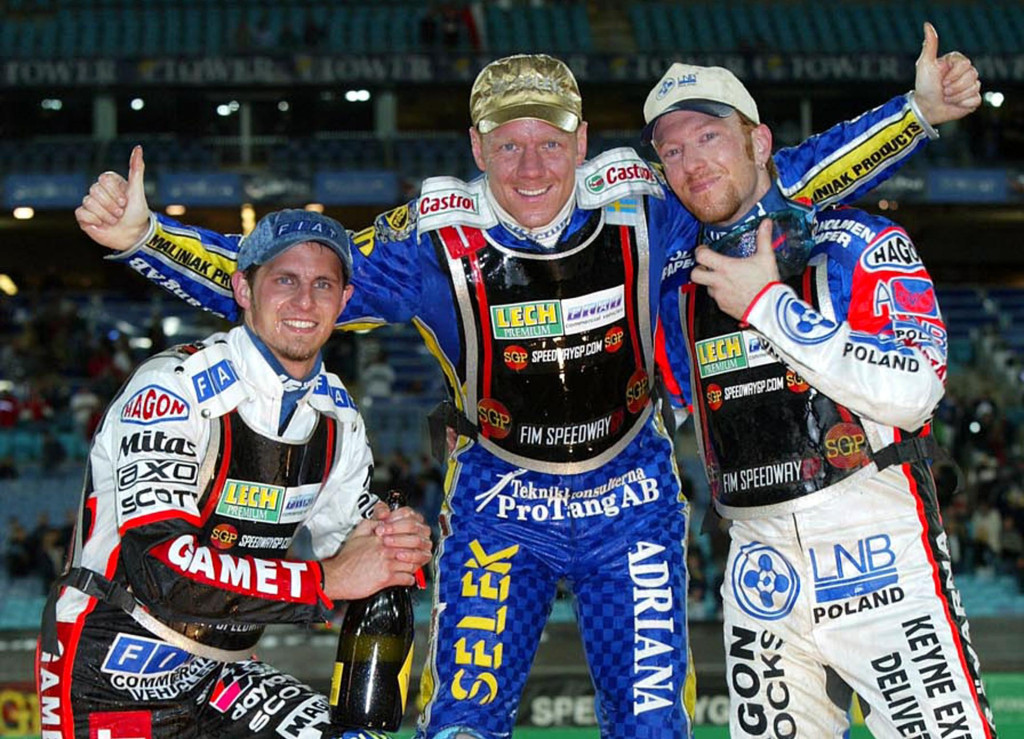 Crump and third-placed Ryan Sullivan join world champion Tony Rickardsson on the 2002 Speedway GP podium in Sydney
Crump and third-placed Ryan Sullivan join world champion Tony Rickardsson on the 2002 Speedway GP podium in SydneyWhat changed when you finally got over the line to become Speedway GP world champion a year later? Did you feel you did anything differently?
“I clearly did something different. I was still determined – I was no more determined or less determined in the years previously. It’s difficult to say I did this or that different. I didn’t start getting out of bed on the other side!
“All of a sudden, I was world champion. It’s not that I didn’t understand why. I did understand why because I was always very analytical in what I did with my racing. It just worked for me, and it was a great reward to have. Most people in speedway knew it was coming. I was probably the one that didn’t understand it the most.”
Your reaction when you realised you had won that first Speedway GP World Championship in Hamar, Norway was full of emotion, and it ended with you falling off your bike amidst the celebrations. Was that just down to the tidal wave of emotions – perhaps elation mixed with relief?
“If someone has been runner-up in the World Championship for three years in a row and then they win it, they would understand that it’s very difficult to describe those feelings.
“It’s a once-in-a-lifetime thing. They are emotions that you don’t get very often. To have the emotion of finally winning after everything I had been through was probably a bit more than I could take at that time.
“It wasn’t the most gracious way to become world champion, to end up on my arse. But who cares?!”
Swedish star Tony Rickardsson won his sixth world title in 2005, before you regained the crown in 2006. Tony was unable to finish the 2006 season, retiring halfway through as he battled with the effects of concussion. Was there any sadness on your part that you couldn’t continue your rivalry with him?
“It makes me laugh now when I read some comments in different places, saying ‘If he didn’t have to compete against Rickardsson, Crump would have won more championships.’ I think I was lucky to compete with and race against Tony because he’s certainly one of the benchmarks of our sport.
“Ultimately, he beat me a few times, but I did actually manage to beat him a few times as well. I am proud of that fact, and I knew that if I did beat Tony, I had got it together because he was a hard man to beat over a six-to-11-round World Championship series.
“Tony raced in 2006. When Tony had fallen off a couple of times and it was clear he wasn’t fit enough to keep going, I definitely didn’t feel relieved in thinking I didn’t have to race against him. I felt a bit of sadness for him that he had to leave the sport in that way. He didn’t deserve that.
“I would have been more than happy to beat him fair and square that year, and I would have been more than happy for him to have been stood one step down from me on the podium. It didn’t happen like that, but when he did stop, I was in front of him in the championship and I think I had the measure of most of them that year – the same as he had the measure of us in 2005.
“He was exceptional, and he raised the bar. I would like to think I worked hard that year to step my game up to hopefully challenge him. I was ready to challenge him whatever happened.”
When you lifted your third Speedway GP World Championship in 2009, you largely dominated that series, winning three of the first five rounds. But disaster struck towards the end when you crashed in Belle Vue’s match with Ipswich at Kirkmanshulme Lane on September 14, suffering nerve damage and burns to your left arm.
You still raced the final two rounds after that fall, scoring four points at the FIM Italian Speedway GP in Terenzano on September 26 and then nine at the final round in Bydgoszcz on October 17 to seal the gold medal. Was it a relief to get this title over the line?
“It was quite amazing that I was even able to ride. I couldn’t ride in Italy. I went there and rode around. I was struggling to ride properly, and I probably shouldn’t have even tried to ride that night. But when World Championships are up for grabs, anything can happen.
“Even on that night in Italy, I got some decent fortune. I think someone broke down in a race and I got a point, which I wasn’t fit enough to get. I just got a couple of points here and there.
“What did me a favour that year was there were three weeks between the last two GPs – not two. It gave me an extra bit of time and I needed all the time I could get. My arm was a big problem, and it was a problem the next year as well.
“Damage was done to a nerve in my arm – to the ulnar nerve, which controls your little finger and your ring finger. I had a huge, huge injury to the ulnar nerve, so I didn’t have full control of my ring and little fingers on my left hand.
“It took a long, long while for that to regenerate and I was very fortunate that I was seen by some of the best specialists in the world.
“The late Dr Aki Hintsa from Finland really helped me. I went to Aki’s clinic in Finland and, between his clinic in Turku, Finland and one in Geneva, Aki and one of his good friends carried out surgery and rehabilitated the nerve as much as they could. I owe Aki and his buddy a huge amount of thanks – not only for what they were able to do for me in the short term, but also for the long term and the rest of my life. Now it’s pretty good.
“It was a shame that 2009 season had to end the way it did, but that’s racing, and you take the good with the bad. I did manage to get just enough points to win the championship by 15 in the end, so I was happy with that.
“Then I got another podium the year after in 2010. From then on, as much as I thought I wanted to be world champion again, I was a little bit burnt out. The 10 previous years had taken a lot out of me. I was pretty much coming to the end of my time at the top of speedway, and so it turned out.”
You finished on the Speedway GP podium for the 10th straight season when you won bronze in 2010. Only you and five-time FIM Speedway world champion Ove Fundin have registered 10 consecutive years on the podium. How much pride does this record give you?
“Of course, I am very proud of that – to share that record with Ove at the moment is really special.
“But all records are made to be broken and I guess Bartosz Zmarzlik is going to rewrite the record books in speedway. If all things stay fair, he should do.
"He deserves to do it and he has thrown a huge challenge out to all the other competitors and all the young speedway riders from around the world.
“If they want to win the World Championship, they certainly have to put a lot in because he puts a lot in. He’s a fantastic rider, he’s a good guy, he loves speedway, he loves the history of the sport and in the next 10 years, he’s going to take a lot of beating.”
Bartosz now shares your record of 23 Speedway GP wins after he lifted the 2023 Speedway GP World Championship with victory in the DeWalt FIM Torun Speedway GP on September 30 …
“It’s a record I share with him until the start of next year!”
How many world titles could he go on to win?
“He’s on four world championships now. Would you be surprised in 10 years’ time if he’s a 10-time world champion? I most definitely wouldn’t be.
“It’s a challenge all the riders in the Grand Prix and all the riders who aspire to be in the Grand Prix have to be prepared to accept. There is no question that he is beatable every now and then.
“But over the course of a season, just now anyway, the current field and the future of speedway definitely have to step it up to be able to consistently take on Bartosz and come out with success.”
Among the 23 Speedway GPs you won are three FIM British Speedway GP wins in Cardiff. You topped the Principality Stadium podium in 2006, 2008 and 2009 – the last of those with a seven-ride maximum. How much did those victories mean to you?
“Cardiff for us Aussies was almost like a home GP. Until Warsaw came along, Cardiff was the biggest Grand Prix of the year. Cardiff is Cardiff. It has a special atmosphere. It has always been a fantastic crowd and a great atmosphere.
“With the racing, sometimes Cardiff brought the best out of me. Sometimes it brought the worst out of me.
“On that night when I won in 2009, it felt like I could have had 100 races, and I probably could have won them all. That’s just me talking, but I thoroughly enjoyed that one. I am very proud to have my photo on the wall in the Principality Stadium corridor.”
You retired from Speedway GP at the 2012 season finale in Torun, and there was something of a passing-of-the-torch moment as Chris Holder became Australia’s fifth world champion.
Before Holder sealed victory, he had a tense showdown with title rival Nicki Pedersen after they crashed following a close first turn in their semi-final.
They were involved in an altercation as they left the track, but you smoothly moved in and took Chris away to a quiet corridor to regain his composure for the re-run. It clearly worked as he sealed the trophy. What are your memories of that moment?
“Ultimately on the track, Chris was going better than Nicki that night. Nicki is no fool; he realised that. Chris was young and inexperienced. All he wanted to do was race. He probably wasn’t aware at that stage of his career of what Nicki was trying to do, which was to get him riled off the track so that by the time they got to the start for the re-run, Chris was thinking about having a fight with Nicki rather than thinking about winning the race.
“Chris just needed somebody to remind him that all the other carry-on wasn’t going to help him become world champion. Five minutes of concentration was going to make him world champion and he probably just needed somebody to remind him of that for a minute.
“I did feel like my time was done. I think I told Chris earlier in the year that I was done with the Grand Prix. I actually told a few people, and no-one believed me!
“That couple of minutes spent with Chris didn’t enable him to do anything that in normal circumstances he wouldn’t have done. But at that particular moment with the emotion that he was under and with a World Championship on the line, he probably just needed some reassurance.
“I hope and I feel it did help him in a little way. But ultimately, he was still the one on the bike and he had to put it all together, which he did. I was very happy for Chris that night.”
Since that night, we have seen Greg Hancock win two more Speedway GP World Championships. He raced his last Speedway GP aged 48 in 2018. Nicki Pedersen will race on into 2024, turning 47 at the start of the season.
You were 37 when you stopped racing in 2012. Do you feel you walked away too early?
“At the start of 1993, I was 17 years old and racing in different speedway leagues, the Long Track World Championship and the World Under-21 Championship. By 2012, I had done 20 years of racing at a pretty decent level. I was pretty much just worn out. Maybe my career was a bit shorter because maybe I was too hard on myself for parts of my career. I don’t know.
“But 20 years seemed like not a bad run to me. I didn’t feel like I had the drive to become world champion like I had previously. For me, it was a reasonably easy decision to make.”
After you ended your career and jetted back to Australia in 2012, what came next?
“Like most riders at the end of a career, I was a little bit lost. I had a year when I didn’t do a whole lot. I had a few injuries fixed up and spent a bit of time with doctors and hospitals in Aussie, trying to make sure I was as good as I could be for the rest of my life.
“I didn’t really have a lot to do with speedway for a while, apart from going to the odd meeting here or there.
“When you have raced for 20 years like I had and travelled to Poland, Sweden and Denmark every week and raced a Grand Prix every second weekend, it takes a bit of getting used to – not being a rider. It took me a little while to figure out where I was going and what I was doing. That led back to another go on the bike in 2021.”
You briefly returned to the sport, racing for Ipswich in the British Premiership and Plymouth in the Championship in 2021. What did you expect from that comeback season in which you celebrated your 46th birthday?
“I was never going to be the same rider and I didn’t expect to be the same rider. I was doing it for a different reason. I was doing it because I had done a few meetings in Aussie, had a bit of fun and thought maybe I should do it.
“Ultimately, it didn’t turn out the best, but it’s something I did. Now I am nearly 50 years old, and the opportunity is not really there to go and race my motorbike.”
You followed your grandfather Neil Street and dad Phil into the sport. Now your son Seth races in the British Supersport Championship. How is he getting on?
“Seth loves road racing, and he has been at it for a few years in England now. He’s making some progress. It’s a long path in road racing and it’s very different to speedway in the way it all works.
“If he keeps his head down and continues to put in the effort that he is, who knows where he can get to? He enjoys it and he loves it. Of course, I hope he is fortunate like his father, grandfather and great grandfather and can earn a living from motorcycle racing.”
Thanks very much for sharing your story, Jason and congratulations on an incredible career.
